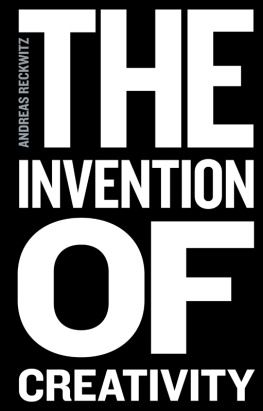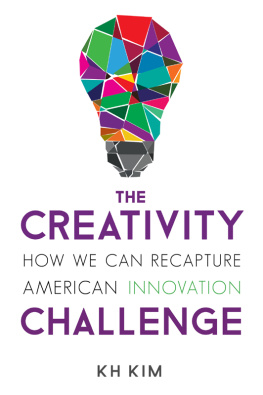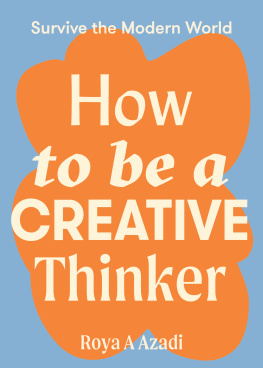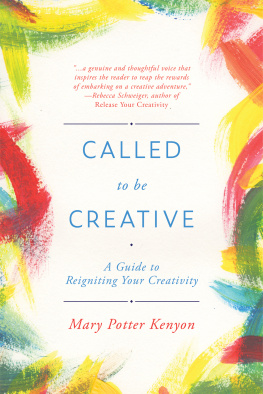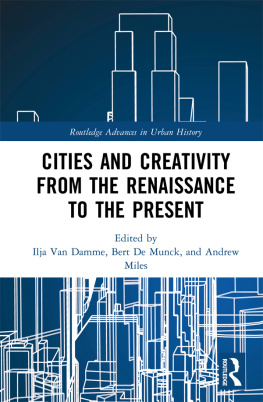
Copyright page
First published in German as Die Erfindung der Kreativitt. Zum Prozess gesellschaftlicher sthetisierung Suhrkamp Verlag, Berlin, 2012
This English edition Polity Press, 2017
The translation of this work was funded by Geisteswissenschaften International Translation Funding for Humanities and Social Sciences from Germany, a joint initiative of the Fritz Thyssen Foundation, the German Federal Foreign Office, the collecting society VG WORT and the Brsenverein des Deutschen Buchhandels (German Publishers & Booksellers Association).
Polity Press
65 Bridge Street
Cambridge CB2 1UR, UK
Polity Press
350 Main Street
Malden, MA 02148, USA
All rights reserved. Except for the quotation of short passages for the purpose of criticism and review, no part of this publication may be reproduced, stored in a retrieval system or transmitted, in any form or by any means, electronic, mechanical, photocopying, recording or otherwise, without the prior permission of the publisher.
ISBN-13: 978-0-7456-9703-1
ISBN-13: 978-0-7456-9704-8 (pb)
A catalogue record for this book is available from the British Library.
Library of Congress Cataloging-in-Publication Data
Names: Reckwitz, Andreas, author.
Title: The invention of creativity : modern society and the culture of the new / Andreas Reckwitz.
Description: Malden, MA : Polity, 2017. | Includes bibliographical references and index.
Identifiers: LCCN 2016043495 (print) | LCCN 2016057624 (ebook) | ISBN 9780745697031 (hardback) | ISBN 9780745697048 (paperback) | ISBN 9780745697062 (Mobi) | ISBN 9780745697079 (Epub)
Subjects: LCSH: Cultural industries. | Creative ability. | Social sciencesPhilosophy. | BISAC: SOCIAL SCIENCE / Sociology / General.
Classification: LCC HD9999.C9472 R43 2017 (print) | LCC HD9999.C9472 (ebook) | DDC 338.4/77dc23
LC record available at https://lccn.loc.gov/2016043495
Typeset in 10.5 on 12 pt Sabon by Toppan Best-set Premedia Limited
Printed and bound in the UK by CPI Group (UK) Ltd, Croydon
The publisher has used its best endeavours to ensure that the URLs for external websites referred to in this book are correct and active at the time of going to press. However, the publisher has no responsibility for the websites and can make no guarantee that a site will remain live or that the content is or will remain appropriate.
Every effort has been made to trace all copyright holders, but if any have been inadvertently overlooked the publisher will be pleased to include any necessary credits in any subsequent reprint or edition.
For further information on Polity, visit our website: politybooks.com
Preface to the English Edition
The first German edition of this book appeared in 2012. This English translation provides the occasion to re-evaluate the book within the context of the Anglophone discussion around creativity and society that has been emerging since the beginning of the new millennium. An aspect of this re-evaluation is the question as to what degree the book reflects a specifically German context.
The role of creativity as a cultural blueprint and an economic factor in the formation of late modern society first emerged as an object of inquiry around 2000, particularly in Great Britain, North America and Australia, where it has remained prominent in discussion in sociology as well as in broader intellectual and political discourse. Two of these contexts are of particular note here. First, a mainly academic but also popular discourse has been taken up on the relevance of creativity to the economic prosperity of contemporary societies, regions and cities and the emergence of a creative class of producers and consumers. This discussion has also carried over into political consulting and urban planning.
The Invention of Creativity takes a step back from these sociological and economic analyses of the creative economy of the present and takes in a more historical and theoretical view of society as a whole. The book regards today's creative industries as the tip of a much bigger iceberg, which conceals below the surface a more fundamental and historically far-reaching transformation of modern Western society. The main claim of the book is the following: late modern society has been fundamentally transformed by the expectation and desire to be creative. What is meant here by creativity is the capacity to generate cultural and aesthetic novelty. Modern society has become geared to the constant production and reception of the culturally new. This applies to the economy, the arts, lifestyle, the self, the media, and urban development. We are witnessing the crystallization of what I have called a creativity dispositif, which is increasingly determining the shape of late modern society.
The term dispositif signals a certain influence coming from Michel Foucault. The book undertakes a genealogical analysis. I reach from the present back into the past, through the twentieth century as far back as the late eighteenth. Creativity is taken not as a given but, rather, as an enigma, as sexuality was for Foucault. How did creativity come to be accepted as a desirable norm? In which heterogeneous complexes of practices and discourses has the dispositif of creativity gradually been developing? The genealogical approach avoids economic reductionism. The economy is certainly one of the main places where the culture of the new develops a complex I refer to in the book as aesthetic capitalism. Yet the scope of the creativity dispositif extends beyond that of the economy. It also takes in the internal dynamics of media technologies and the human sciences, above all psychology, with its techniques of the self. Since the 1980s, the dispositif has also been propped up by state control in the form of what I have called cultural governmentality, urban planning being among the most conspicuous examples of this. Yet political reductionism must also be avoided. As such, the study undertaken here is not orthodoxly Foucauldian. It is concerned less with revealing the creativity dispositif as a new system of domination than it is with working out the internal dynamics and the internal contradictions of what can be called the society of creativity. For my line of argument, the following point is crucial: in modern culture, the orientation towards creativity began in romanticism in the marginalized niche of the arts. Ever since, it has been spreading to more and more parts of society. Sociology therefore has to take the field of the arts more seriously than it did in the past. The arts do not merely watch from the sidelines; instead, they are a structural blueprint for late modern society as a whole.
In this process, the tension between an anti-institutional desire for creativity and the institutionalized demand for creativity has continued to mount to the present day and has now become acute. For this reason, it is important to take seriously the affective dimension of the creativity dispositif, the importance of aesthetic practices in contemporary society, the existence of what I have termed aesthetic sociality, and the way the dispositif directs audiences sensuous, affective attention. These aspects have been left underexposed by the tradition following Foucault. Yet they need to be brought to light if we are to be able to take up a critical stance towards the society of creativity.
Next page
